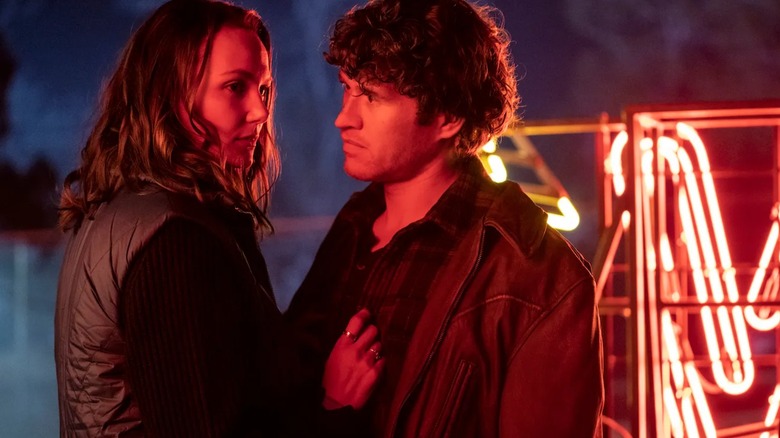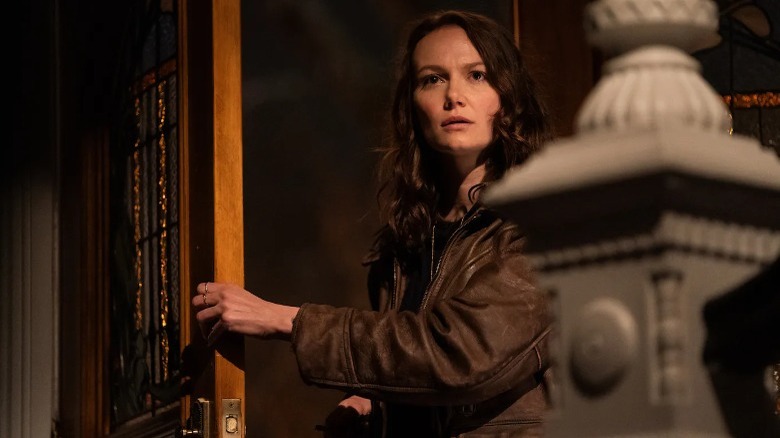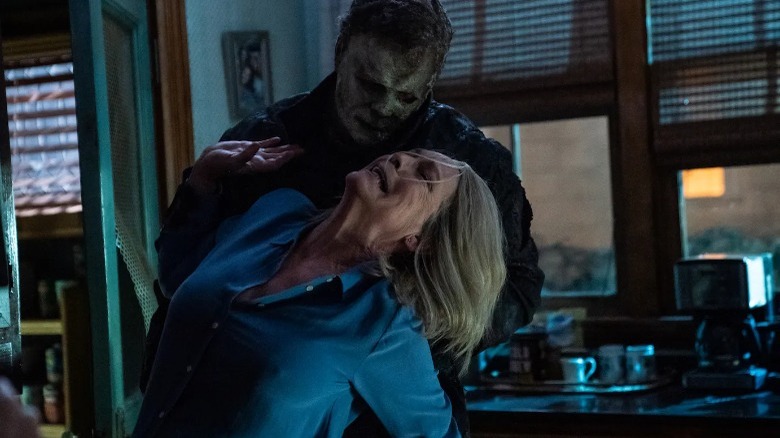How Halloween Kill's 'Devastation' Led To Halloween Ends' Love Story
This post contains spoilers for "Halloween Ends."
David Gordon Green has rounded up his "Halloween" reboot with the recently released "Halloween Ends," which puts a stopper on the Michael Myers saga for good (for now). After surviving Michael multiple times and undergoing immense trauma for 40-odd years, Laurie Strode (Jamie Lee Curtis) engages in a final confrontation with the masked killer in Green's final film in the trilogy. The stakes are obviously high, as one expects a lot of slashing and unexpected deaths to occur. However, "Halloween Ends" makes the bold choice to swerve in fresh directions and firmly positions a love story at the center of the penultimate entry.
In an interview with IndieWire, Green explained that the utter devastation at the end of "Halloween Kills" haunts the characters in "Ends," especially Allyson (Andi Matichak), who lost her loved ones in "Kills." Although "Ends" retains the carnage and gore that characterizes the franchise, Green opted to mix the genre up with a love story directly connected to the horror elements in the film. He said:
"I wanted to write an action movie and a love story at the same time and see how they juxtaposed each other, and it was just fun because I like to mix it up in genres...I knew where I wanted to go atmospherically and I knew I wanted to be very romantic, and I knew I wanted to put my heart on my sleeve and make a movie about bad boys and motorcycles and leather jackets and that kind of thing."
While Green's decision to position love at the center of a definitive entry in a long-standing franchise might seem odd at first glance, it makes sense within the context of the horrific events that shaped "Halloween Kills." Here's how the two are connected.
To not give into fear, and love freely
The events of "Halloween Ends" take place four years after those of "Kills," and a lot has changed since Michael's disappearance after his murderous rampage. At the end of "Kills," Laurie comes to the realization that it is fear that empowers Michael Myers, as his evil is the kind that grows with the fear he evokes in people. Having lost her daughter, Karen (Judy Greer), Laurie decides to let go of her fear and paranoia in an attempt to lead a freer life. So does Allyson, who is dealing with immense loss in her own way and doing her best to stay sane.
Love blossoms when Laurie introduces Allyson to Corey Cunningham (Rohan Campbell), a man who is painted as a monster by the people of Haddonfield. While Allyson is drawn to Corey due to his trauma, which she can relate to, she is also attracted to his emerging "bad boy" persona and the darkness that comes with it. Corey and Allyson's relationship is not healthy by any means, and it is not meant to be, as this is an instance of two people trauma-bonding and finding ways to heal their respective wounds. Sure, there's a sense of sweetness to their relationship, but after Corey meets Michael, evil finds a new host and morphs into something uglier.
"Halloween Ends" is a deeply divisive film, as it focuses exclusively on a new character, with Michael playing second fiddle. However, Green wanted "Ends" to be an exploration of the toll trauma takes on survivors and how difficult it is to navigate everyday life while shouldering that burden. Even when love finds a way, it is undercut by the darkness that hides in the sewers, waiting to pounce when one least expects it.
A point of no return
Green talks about this aspect in the interview linked above, in which he explains that the "devastation" of "Kills" was definitive and could not be upscaled and replicated. As Karen's death, along with that of many innocents, was the point of no return in Haddonfield history, "Ends" needed to balance its darker elements out with something sweet, albeit tinged with tragedy. This works in the context of the film's boldness to swerve in unexpected directions, as Laurie and Allyson's lives are once again molded by a morphed form of evil that mirrors the atrocities Michael Myers committed. Despite the pain, there's no choice but to end the cycle once and for all.
While the love story works on a fundamental level and provides momentary solace to the parties involved, it also comes at the cost of plot coherence. The copycat killer aspect is disappointingly under-baked, as Corey's transformation from a bullied, traumatized man to Michael's apprentice lacks conviction and nuance. It is also baffling that Allyson, who witnessed her grandmother's trauma firsthand and experienced it along with her, would be so quick to turn on her in favor of some dude she knew for two whole days. It is probable that Green wanted to highlight that grief and trauma make us act in uncharacteristic ways, but the execution of this intent is not solid enough to seamlessly unite the disparate elements of the film.
Nevertheless, Green has fun with the central love tale, which also allows him to explore character psyches on a deeper level. Irrespective of whether you liked "Halloween Ends" or not, it is important to acknowledge that the film does not follow a set slasher formula and dares to do something different.
"Halloween Ends" is currently playing in theaters.


